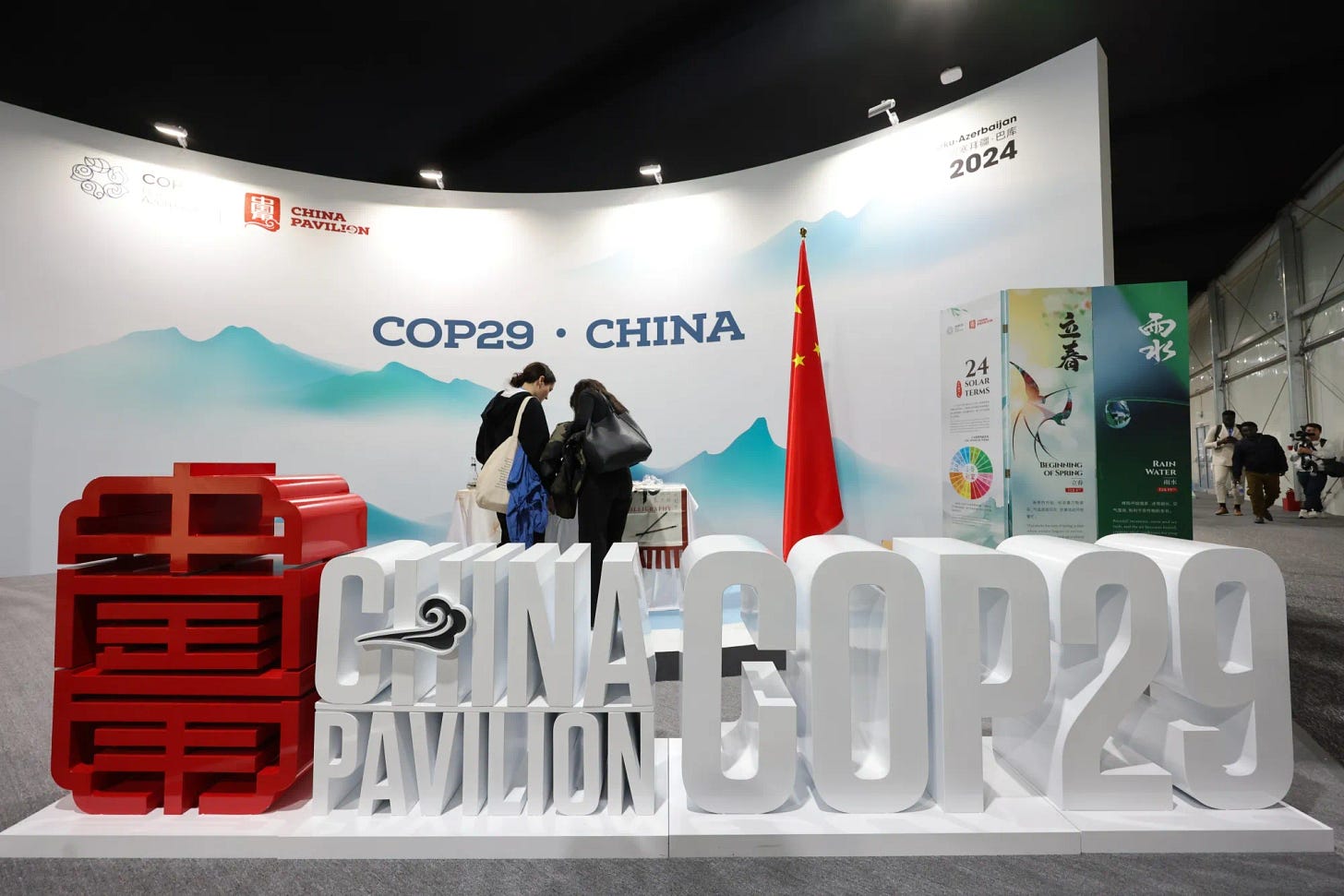US-China and great power climate competition: where do we go from here?
Michael Collins, Head of Energy Transition Research at Energy Intelligence, talks climate and the US-China rivalry, defence v net zero and China's climate leadership
Disclaimer: this newsletter and its contents represent my personal views only, and not necessarily those of my employer.
It’s spring, and where I am the sun is out, the parks and football stadiums are full, and hay-fever inducing pollen infuses the air. Wonderful to be outside if you can stay out!
But what hasn’t changed of late is the tempo of volatility in our geopolitical environment, which has unleashed buzzwords like “polycrisis,” “permacrisis,” “doom loops,” “clown world" and the most Gen Z of them all - “vibes based alliances.” I frankly love that we’ll have a new generation of IR and politics specialists out there who will end up writing job market papers (or TikToks, or both) about LARPing and “hard power flexes”. And what’s driving a fair chunk of current vibes revolves around US-China and, separately but relatedly, the climate crisis.
Continuing our series of expert perspectives, I’ve brought in just the person to talk us through the intersection of these two themes this month!
Joining me is Michael Collins, Director of Energy Transition Research at Energy Intelligence, a leading energy markets and intelligence firm. Michael is responsible for identifying and analysing key trends that illustrate how the energy transition is unfolding, with a focus on key technologies, costs, market developments, policy drivers and geopolitics.
Prior to joining Energy Intelligence in 2024, Michael worked for the UK Government for over a decade, with senior policy and advisory roles at the Department of Energy and Climate Change, Home Office, Foreign Office and Cabinet Office, where he was Deputy Head of Strategic Advantage, specialising in the security and geopolitical aspects of the energy transition. He has written for and advised prime ministers and other senior members of the UK Cabinet.
Michael is also a Research Associate with the Climate and (In)Security Project at Oxford University.
Hey Michael, let’s start with an easy one. Where are we headed with the competition between the US and China around key energy (transition) technologies and critical minerals? And what does this mean for the medium and long-term “cost” of the energy transition globally?
The Trump administration has indicated that it isn't up for taking on China over low-carbon technology. There are clear parallels between Trump's energy and foreign policy: he sees things in terms of spheres of influence. The US's sphere is the Americas and hydrocarbon resources. Trump is happy to let Russia have its sphere of influence in the Former Soviet Union, and China have its spheres in Asia and low-carbon technology. One thing is clear: Trump is content to give China a free run at dominating the global low-carbon economy.
But critical minerals are a slightly different matter. Because of their many applications beyond low carbon energy, Trump seems more up for a fight with Beijing over them - hence the Section 232 investigation initiated on 15 April. My sense is that he is serious about reducing China's dominance in this space, but it’s unclear -how much progress he will be able to make in four years. I imagine some.

As to the cost of the global energy transition, I don't think Trump conceding the low-carbon technology competition to China will have much of an effect: China was already leading it. But we should consider how broader geoeconomic competition between the US and China might affect transition. Energy Intelligence has just written about this. In very high level terms, we see a trade war as increasing risks to the energy transition but - perhaps counterintuitively - likely to accelerate it in some countries as domestically-produced electrons are increasingly viewed as a safer bet for “energy sovereignty” than imported molecules.
Sticking with energy sovereignty: the Global South dominates the flow of goods from Chinese cleantech exports, and in 2024 only 4% of Chinese exports of EV, solar and wind power equipment went to the US, compared with 15% of overall China exports heading to the US. That’s a sharp drop from a decade ago when the bulk of those exports went to the US. If the US remains a marginal player globally, what does that mean for its energy security over the next couple of decades? Does it really matter in the coming years from a great power competition perspective what the US’ energy mix is?
The core objective of energy security remains to provide citizens with cheap and reliable energy. And if decarbonisation objectives are not a priority, then it is perfectly acceptable - ideal, even - to meet those needs through domestically produced hydrocarbons. That is energy security. The problem comes if the rest of the world decarbonises without you and so (1) you find that demand/prices for your surplus hydrocarbons are low and (2) your industrial products face carbon taxes when trying to enter other markets. So I am fairly confident that Trump's energy policies will deliver US energy security, but I wonder at what opportunity cost elsewhere in the US economy.
The other angle to consider is the geopolitical dividend that China stands to gain by not just supplying low-carbon technology but also potentially financing low-carbon projects globally. China can present a very compelling narrative to potential partners: rather than relying on imported fossil fuels for years and years, surely better to buy once from China and then make your own energy? That would yield new relationships and influence. When we zoom out and look at the global picture of US-China competition, I think it absolutely will matter which energy path those two countries choose to follow.
We’re so focused on “core” trade competition and tariffs these days. Does climate-driven diplomacy and investment remain a positive policy “winner” for the likes of Europe and China, relative to more “conventional” trade and hard security diplomacy that is currently en vogue?
There's a clear logic to the argument that demonstrating climate leadership yields geopolitical benefits. This is another area where the Trump administration has decided that it does not want to compete - so, yes, I think there is a potential opportunity for the EU and China to win influence, particularly in the Global South. But so far they either seem unable or unwilling to seize that advantage. The EU is bogged down managing internal divisions over its Nationally Determined Contributions central to its 2030 climate targets - a conversation complicated by US policy on both trade and Ukraine/NATO/defence, which is distracting leaders and tightening fiscal headroom. China has consistently passed up the opportunity to present itself as the saviour of international climate action. I don't know why: it seems like an obvious and easy win for them.
Are there tradeoffs and dilemmas for the EU and UK when it comes to an energy transition while fighting the realities of geopolitics and their own internal industrial base?
The question assumes that there are tradeoffs and dilemmas between decarbonisation, geopolitical and economic objectives - but not everyone agrees. Through its Clean Industrial Deal, for example, the EU has clearly articulated its belief that all three priorities can be pursued together: supporting the development of clean industry can help bring down emissions, improve economic competitiveness through lowering energy prices, and yield geopolitical dividends by reducing dependence on fossil fuel imports and making the EU a climate leader. As we argued in a paper on Energy and Competitiveness, the EU seems to have calculated that pursuing low-carbon energy is its only chance of regaining industrial competitiveness. The UK Government seems similarly committed to the transition (eg 95% decarbonising its power sector by 2030) - though apparently motivated more by decarbonisation objectives than geopolitical or economic ones.
Having said that, Trump's return has led both the EU and UK to conclude they need to increase defence spending. That may or may not affect their spending on the transition, we'll have to wait and see. But as we see from recent Bloomberg analysis (below graph) I find it fascinating that though China is still spending over three times as much on the transition than defence, despite its perceived need prepare for the potential of major power conflict.
China at least realises that the energy transition is inherently part of geopolitical, defence and strategic advantage. I don't think the West has properly grasped this yet.
Trade tensions are the other angle which many are pointing to as a potential headwind for the transition. But as I said above, we think that many countries - particularly those without indigenous fossil fuels - will conclude that persevering with the energy transition is ultimately in their economic interest.
China is also a leader in preparing to survive and adapt to the climate crisis. It is a leader in climate adaptation and resilience e.g. coastal protections, sponge cities, afforestation. Adaptation is also what leaders of many developing countries arguably find more pressing than mitigation. Do you see competition - technological, funding, policy - over whoever “who helps countries survive” climate realities emerging in the coming years?
Yes, I think developed countries should be falling over themselves and competing with each other to help developing countries with both climate mitigation and adaptation. The geopolitical benefits of doing so are obvious. Yet that penny does not seem to have dropped yet, and with the US stepping back from climate leadership and climate finance there is only really the EU, UK, Japan and one or two others in a position to compete with China on this. And yet China also seems slow out the blocks on this one".
Why do you think we have yet to see China step into international climate leadership in a bigger, more assertive manner?
First, China's idea of being a global superpower doesn't align with how the West sees things. It doesn't want to be the global police officer, underwriter of global development, international peace broker, etc. I think it genuinely thinks that the US's approach has been expensive and thankless. So it is naturally sceptical of assuming “global leadership” on anything (other than tech).
Second, my guess is that China believes there is no need to position itself as the leader. Its current approach gives it sufficient flexibility to reap most of the geopolitical benefits without being bound by the main overheads. Its approach to the negotiations at COP29 illustrated this approach perfectly. It dug in its heels about keeping its status as a non-Annex I country and I think played a blinder on negotiations on the global New Collective Quantified Goal on climate finance: China is not bound to commit any finance, but any that it does commit can be counted towards the total figure. In other words, it's not obliged to be the hero, but will take the plaudits if it decides that it wants to be.
I still think they are missing a trick by not embracing climate leadership more fully, but I think this is probably their logic.
Finally, when we think about the wars of the future - how do you see the energy transition coming into the frame with regards to economic and military strength, the focus of what is contested, and modes of targeting / gaining advantages over an adversary?
We should assume, of course, that future conflicts - economic or “hot” - would involve the participants identifying, exploiting and if necessary kinetically targeting every part of each other's economies. As we see in the Ukraine-Russia conflict, energy will absolutely be part of that. Here I wonder if the energy transition presents countries with an opportunity to improve their resilience in the face of a determined adversary: decentralised energy networks are harder to cripple; a lower reliance on fossil fuel imports means fewer vulnerable supply lanes; etc.
Having said that, we would expect to see different aspects of the low-carbon economy being weaponised: critical minerals (as is already happening) but also underwater infrastructure like interconnectors being at risk of sabotage, more cyber attacks on a more digitalised energy network. Finally, there's also the issue of the relationship between clean technology and military applications, as China appears to have concluded that low-carbon technological development can help its military’s force readiness and ability to win on the battlefield in a major conflict.
And briefly, what caught my eye
A climate risk seance: I recently came across this white paper from JP Morgan published earlier this year about what they term “climate intuition” or the ability to better understand future climate likelihoods and ask smarter questions on related tech, policy, geopolitical, and environmental issues. It matters to them because they believe it would become increasingly critical in identifying and pricing financial risk. Interestingly, they see national security issues in energy independence as a notable source of both risk and investment opportunity. Climate security, in as many words.
Getting people to pay for adaptation is still tough! But it shouldn’t be: The folks over at Taliwind Climate recently published a primer on emerging mechanisms around climate adaptation financing. It’s a good overview of the current state of play of both public and private financing, the glaring gaps within and between developed v developing countries. A lot may sound familiar to those already in the space, but if you’re new to “how do I solve for climate insecurity and pay for it” - it’s worth a read.
The multi-trillion dollar opportunity of looking at stuff from space: More accurately called Earth Observation, a recent Invested in Climate episode discussed how there is a potentially $4 trillion opportunity in economic value from better collecting and analysing earth data collected from satellites. If you want one day to be able to ask “show me where solar panel farms have been installed in California over the past three months” or “where has there been the most damage to the environment from the war week by week” then this episode should be fascinating for you.







